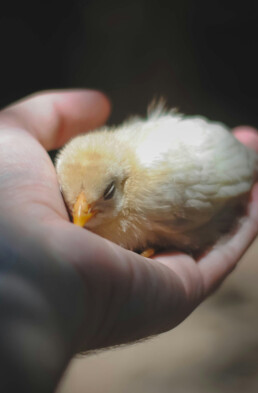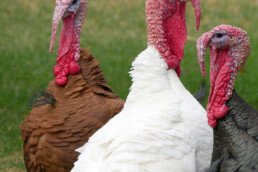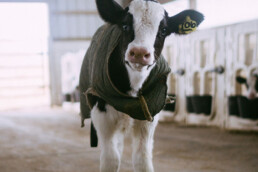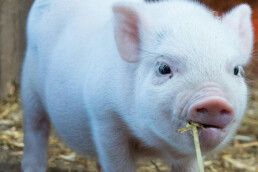Navigating Animal Hardships
A Leap Towards Humane Practices: From Chick Culling to In Ovo Sexing
In the pursuit to end the culling of male chicks in the egg-producing industry, advancements in ovo sexing technologies offer hope. The Respeggt technology, for example, detects the sex of chicks in the egg as early as the 9th day after incubation, negating the need for hatching and subsequent culling of male chicks. Despite legislative resistance and claims of impracticality, the Respeggt method’s successful implementation in businesses and the ban on chick culling in countries like France and Germany demonstrate its feasibility and effectiveness. The adoption of such in ovo sexing technologies could eliminate the birth of approximately 65,000 male chicks per day, significantly reducing annual culling numbers in Flanders.
The Forgotten: Welfare Issues of Day-Old Male Chicks
In the egg-producing industry of Flanders, around 24 million male chicks are gassed shortly after birth. This fate is due to their inability to lay eggs and hence, their economic redundancy.[1]
Welfare Concerns During Sexing
Even in the brief span of their lives, these chicks face several welfare issues. The first day, which they spend in the hatchery, is filled with stress due to changes in temperature, noise, handling by staff for sexing, and being crowded on a conveyor belt with a multitude of other chicks. [2] Manual sexing can cause stress and potential injuries. Moreover, the rapid movement of the conveyor belts in the hatchery, coupled with falls from heights between 7 cm to 55 cm during transfers, add to their distress.[3] In addition, chicks frequently tumble off these conveyor belts.[4]
Chicks on a conveyer belt [5]
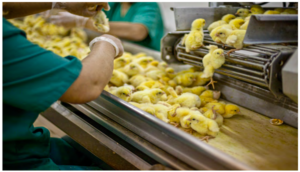
Welfare Concerns During Gassing
One-day-old male chicks are subjected to carbon dioxide gassing, which leads to suffocation. This process impacts their welfare, causing pain, fear, and respiratory distress before their death.[6] In poultry, exposure to CO2 results in mucous membrane irritation, burning eyes, and a sensation of suffocation.[7]
Ineffective Legislation
Although the Flemish Animal Welfare Code imposes a ban on killing one-day-old chicks bred for egg production, it stipulates that this ban will only be enforced in the future when the Flemish Government determines the feasibility of sexing chicks in the egg by the 12th day after incubation.
The Explanatory Memorandum suggests reasons why ending the killing of one-day-old chicks is currently impossible:
‘At present, four techniques can identify the sex of eggs in ovo. These include DNA analysis, hormonal determinations with and without the use of mass spectrometry, near-infrared spectroscopy, and one based on genetic manipulation.
However, these systems have significant shortcomings preventing their widespread adoption. For instance, they cannot be applied to all eggs, and a substantial proportion of eggs yield no results or unclear ones. Additionally, most techniques have a lengthy analysis time, ranging from 20 minutes to an hour before results are obtained. Some techniques only work at a relatively late stage in the incubation process, and it is preferable to be able to do this at an earlier stage. Lastly, the economic feasibility currently hinders the widespread adoption of these systems.’
Yet, there is strong skepticism regarding the accuracy of these reasons.
Paving the Way to Ban Chick Culling with Advanced Technology: The Respeggt Method and Other Innovations
Despite what the legislative framework might suggest, no significant barriers exist to prevent the widespread adoption of in ovo sexing methods.
The Respeggt method, a refined sex determination technique, is already available and feasible. The procedure includes: [8]
- Verification of fertilization within the egg on the 9th day after incubation.
- Creation of a small aperture in the shell of fertilized eggs using a precision laser.
- Extraction of a small sample of amniotic fluid.
- Testing of this fluid with a marking solution for estrone sulfate, a female hormone indicative of female eggs. If the fluid turns blue, it denotes a female egg. Male eggs are sorted out, preventing their hatching and, thus, the birth of male chicks.
Furthermore, the arguments put forward in Flemish legislation to justify delaying a ban on chick culling can be refuted:
- The Respeggt sex determination technique is suitable for both white and brown eggs, debunking the argument that the techniques are not applicable to all eggs.
- The Respeggt method exceeds the desired 98 percent precision in sex determination, refuting the notion of a large proportion of eggs yielding no clear results. PlantEgg also achieves a comparable accuracy[9].
- The speed of the Respeggt machine is sufficient to handle the sex determination of the 47 million eggs that must be sexed annually in Belgium, negating the argument about lengthy analysis time.[10]
- Recent scientific research confirms that the Respeggt sex determination technique is safe to apply on day nine, arguing against the assertion that some techniques only work late in the incubation process.[11] Indeed, a recent study commissioned by the German Ministry of Food and Agriculture (BMEL) and carried out by the Technical University of Munich confirms that the physiological neural activity in chick embryos does not begin until the 13th day of incubation. This implies that chick embryos do not process pain prior to this time. [12]
- The economic feasibility of implementing in ovo sexing is demonstrated by the adoption of the Respeggt method by the Bio-Planet supermarket and the catering company Sodexo,[13] showing that the additional cost is minimal, only an additional 1 to 3 cents.[14]
Given these factors, in ovo sexed eggs can be adopted by other retailers and service providers without practical or feasibility concerns.
Internationally, in-ovo sexing is also considered feasible. In France[15] and Germany [16], a ban on shredding and gassing one-day-old male chicks has been in place since the start of 2022. The killing of chicks intended for the production of consumption eggs should be unequivocally prohibited. The ban can be enforced immediately, as there is no need for a future or delayed ban on chick culling. The Respeggt method already complies with Flemish legislative requirements.
Impact if the Optimal Reality is Realized:
65.000 Animals
65.000 male chicks
__
With the implementation of in ovo sexing technologies, such as the Respeggt method, the practice of culling one-day-old chicks could be eliminated. This would prevent the birth of approximately 65,000 male chicks per day in Flanders. Instead of being hatched and then culled, these chicks will not be brought into existence, significantly reducing the number of chicks culled annually.
[1] The most recent figures are from 2021, when 23.63 million one-day-old chicks were killed in Flanders; Question for Explanation from Meyrem Almaci about the killing of one-day-old male chickens to Minister Ben Weyts, Report meeting of the Animal Welfare Commission of December 7, 2022 (no. 670 (2022-2023).
[2] K. Schwean-Lardner, ‘The Effects of Hatchery Practices on the Welfare of Poultry’ (2018) Advances in Poultry Welfare, 29.
[3] Ibid. 35.
[4] Example: Company video of a hatchery, GeoTech HD, Modern Chicken Hatchery Technology, Poultry Slaughter & Processing Plant, Farming Highest Efficiency, www.youtube.com/watch?v=QnHjj95J0Hk.
[5] Chicks on a conveyor belt, Luis Tato / HIDDEN / We Animals Media.
[6] EFSA, Scientific advice, Killing for Purposes other than Slaughter: Poultry, https://efsa.onlinelibrary.wiley.com/doi/full/10.2903/j.efsa.2019.5850 , 67, Figure 14.
[7] J. Hänsch, ‘Assistance in Stun and Meat Quality in Slaughter Turkeys After Stun with Carbon Dioxide and with Addition of Argon’ (2009) Hannover University, Veterinary Faculty, 12. (Original language: German)
[8] www.respeggt.com/technology
[9] Ibid.
[10] The Respeggt method for gender determination in eggs takes up to 30 minutes for hormone analysis. Yet, this doesn’t affect the commercial breeding of laying hens as large quantities of eggs can be tested at the same time. Each Respeggt machine can test 3,000 eggs per hour. By running hormone analyses in parallel, commercial adoption of this method is feasible. One machine can test 12 million eggs in a year, running 16 hours per day for 5 working days. Given that Flanders needs to sex 47 million eggs annually, four Respeggt machines can handle the task. Phone call with Martijn Haarman on 22 march 2024, Managing Director (CEO) of Respeggt.
[11] The four additional in-ovo sexing companies, namely PLANTegg, InOvo, AAT, and Orbem, also assert that their technology is effective for use 12 days post-incubation.
[12] The study concludes:
‘in summary, it can be said that cardiovascular responses to a mechanical stimulus significantly occurred from ED16, in individual animals from ED15. Additionally, a significant behavioral response to a mechanical stimulus was observed in embryos from ED15 to ED18. Based on the results, it can be assumed that the ability for sensory transmission (nociception) cannot be excluded from ED15 and can be assumed from ED16. Regarding EEG analysis, measurable physiological neural activity in the brain (EEG) was present from ED13. This leads to the conclusion that the ability for sensory transmission (nociception) or the ability to perceive aversive sensory experiences as pain, is potentially present from this point onward. Furthermore, it indicates that until ED12, the processing of a nociceptive stimulus in the brain does not appear to be possible.’
[13] Mariska Bloemberg-Van Der Hulst, ‘Bio-Planet only sells eggs from production without day-old roosters’ (News Article, April 26, 2022) and Sodexo, ‘Sodexo Belgium, leader in sustainable food, now only purchases from egg producers who respect animal welfare’ (News Article, November 28, 2023) Original Text in Dutch.
[14] The cost for applying Respeggt technology is less than 1 cent per egg. The potential additional cost of 1 or 2 cents includes margins and additional logistical expenses in the supply chain. Direct communication with Carmen Uphoff, Chief Operating Officer of Respeggt GmbH.
[15] Decree No. 2022-137 of February 5, 2022 relating to the prohibition of killing chicks from lines of the species Gallus gallus intended for the production of consumption eggs and the protection of animals in the context of their slaughter outside slaughterhouses. (Original source in French)
[16] Law for the amendment of the Animal Welfare Act – Ban on chick killing from June 18, 2021. (Original source in German)


